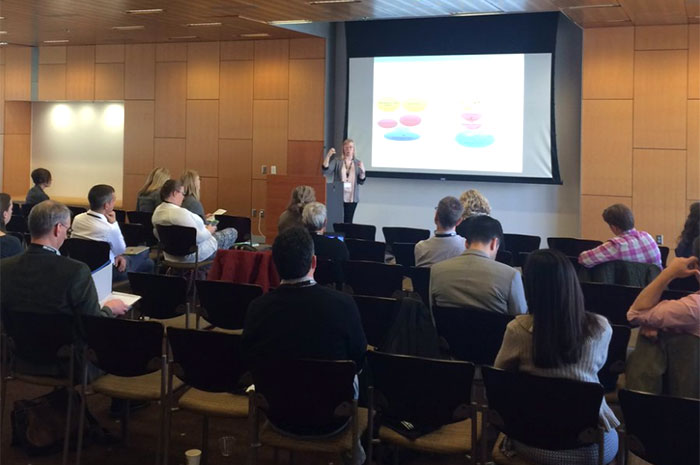This is a special report and perspective from outside the water/wastewater community. We invited Meg to share her insights from the 2018 Society for Economic Anthropology Conference which had a special focus this year on water.

Economic anthropologist Meg du Bray, Idaho State University, presents at the conference in Phoenix.
By Meg du Bray, Ph.D.
EPSCoR MILES Post-doctoral researcher
Idaho State University
Water is life. These words have been repeated from Flint to Standing Rock, from Cape Town to Cochabamba. They can feel trite in a time when water crises span the globe, but these words remain a call to action, a reason to reconsider how we interact with and govern water.
The 2018 Society for Economic Anthropology (SEAs) meeting in Phoenix, Arizona, asked presenters to do just this, and provide examples of how economic anthropology can contribute to understandings of water and water governance. Throughout the conference, anthropologists offered insights into the values embedded in water. While plenty of scholarship addresses the economic benefits of water, including how to govern water as a common-pool resource, the value and values associated with water bear exploration, and anthropologists have a lot to offer.
One of the themes examined throughout the conference was value of water as a clean or pure resource. Throughout his presentation, Dr. Raul Pacheco-Vega discussed the value of water, particularly when it becomes bottled and is seen as “drinkable.” Disasters and human health concerns in Mexico have contributed to the valuation of bottled water in Mexico. Pacheco-Vega further argued that the government of Mexico has abdicated its responsibility to provide safe drinking water.
The combination of unsafe infrastructure and the disasters that have rendered tap water in Mexico actually unsafe reinforces the idea that citizens should invest in bottled water, which is seen as the “safe” and “healthy” option. Given the surge in bottled water consumption and the movement away from tap water consumption, Pacheco-Vega argues that the human right to water is being commodified. As he noted during the discussion portion, every peso being spent on bottled water removes funding from implementing safe and secure water infrastructure.
Profit margin on bottled #water second only to academic journal publishing –@raulpacheco on the global environmental paradox of bottled water #EconAnth2018 pic.twitter.com/68vjbCKiEc
— Sara Meerow (@SaraMeerow) March 3, 2018
The ability to pay for bottled water has also become a status symbol, and living in an area where water is bottle and exported elsewhere produces a sense of pride. Water is not simply marketable for health and safety reasons; it is also marketed as a pure resource, which connotes a non-monetary value, as well as the market value and cost of bottled water.
Although Dr. Leila Harris did not discuss water consumption, her presentation explained how indigenous titles in Canada have thus far not included water rights. Although hunting and fishing rights are often included in treaty rights, water rights have rarely been considered in treaty conversations, begging the question about the way water is valued between white and indigenous communities. Harris’s discussion included a description of first in time, first in right as it has been used in Canada.
While indigenous communities have used the water in Canada for time immemorial, water rights in Canada start at 1865, and no First Nations were allowed to file a water right until 1888. While water may be governed as a common-pool resource, issuing water rights is a means of exclusion, rather than collaboration, particularly when indigenous communities are dispossessed from their water rights, and the non-monetary value imbued in that water.
Wonderful presentation as ever from @leilaharris on water governance #EconAnth2018 @AWutich @mhberesford pic.twitter.com/3LEzrhLANZ
— Jessica Budds ???????? (@jrb_tweets) March 3, 2018
In spite of these challenges, Harris indicated that there are opportunities for co-governance and adaptive governance with the inclusion of indigenous voices, which would begin to address some of the environmental justice concerns embedded in thinking about water rights and the human right to water.
Water is fluid, and just as it flows, morphing from one form to another across the world, the values embedded in water are also fluid. There is economic value, health value, the value of knowing there is a stable, steady water supply. There are also the cultural values that become embedded in water as we interact with it, and the 2018 meeting of the Society for Economic
Anthropology offered an opportunity to consider the cultural and economic values embedded in water, and how these have changed over time. Among other excellent presentations, presenters Dr. Pacheco-Vega and Dr. Harris offered two insights into the valuation of water, how the human right to water relates to these values, and truly, how water is life.
Closing out #EconAnth2018 with a wonderful ethnographic film on the Flint, Michigan water crisis called “Nor Any Drop to Drink” contributed by Dr. Cedric Taylor & colleagues pic.twitter.com/Khe32jrRYr
— Amber Wutich (@AWutich) March 3, 2018